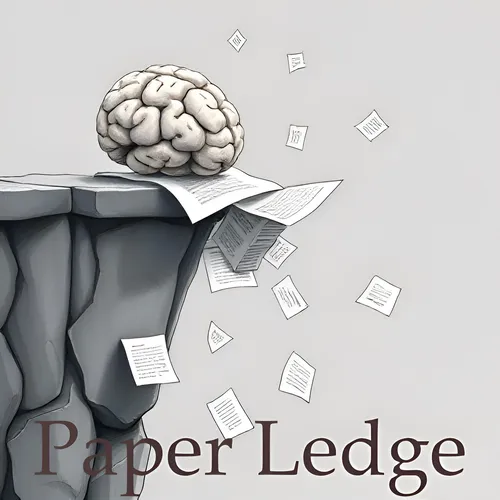Artificial Intelligence - Modeling Latent Partner Strategies for Adaptive Zero-Shot Human-Agent Collaboration
- Author
- ernestasposkus
- Published
- Tue 08 Jul 2025
- Episode Link
- https://www.paperledge.com/e/artificial-intelligence-modeling-latent-partner-strategies-for-adaptive-zero-shot-human-agent-collaboration/
Hey PaperLedge crew, Ernis here, ready to dive into some fascinating research about teamwork – specifically, how AI can learn to be a better teammate, even when thrown into the deep end with someone they've never worked with before!
We're talking about a paper that tackles a problem we've all faced: working with someone new and trying to figure out their style, fast. Think of it like joining a pickup basketball game. You need to quickly understand if your teammate is a shooter, a driver, a passer, and adjust your game accordingly, right? This is even harder when there's a clock ticking down and a complicated play to execute!
Now, the researchers were looking at this challenge in the context of human-AI teams. Imagine an AI helping you cook a meal in a chaotic kitchen. It’s not just about knowing recipes; it’s about understanding your cooking style and adapting to it on the fly. Do you prefer to chop veggies first, or get the sauce simmering? The AI needs to figure that out to be a helpful sous-chef.
The core idea is that the AI needs to do three things:
- Recognize different "strategies". It needs to see patterns in how people play the game or do the task.
- Categorize those strategies. Think of it like sorting players into buckets: "the aggressive scorer," "the team player," "the defensive specialist."
- Adapt its own behavior. Once it knows your style, it needs to adjust to complement it.
To achieve this, the researchers created something called TALENTS, which is a cool acronym for their strategy-conditioned cooperator framework. Sounds complicated, but here’s the breakdown.
First, they used something called a variational autoencoder. Don’t worry about the name! Think of it as a machine learning tool that watches a bunch of people play the game and tries to find the underlying "essence" of each player's style. It creates a sort of "strategy fingerprint" for each player.
Then, they used a clustering algorithm to group these strategy fingerprints into different types. So, maybe one cluster is "players who focus on prepping ingredients," and another is "players who are all about cooking the dishes."
Finally, they trained the AI to be a good teammate for each of those player types. So, if it sees someone who's all about prepping, it knows to focus on cooking, and vice-versa. It's like having a team of AIs, each trained to work perfectly with a specific type of human player.
But what if the AI encounters a player it's never seen before? This is where the fixed-share regret minimization algorithm comes in. Again, sounds complex, but the key is "regret." The AI is constantly asking itself, "Am I making the best move, or should I be doing something different to better support my partner?". It adjusts its strategy based on how much "regret" it feels about its previous actions. It's like constantly course-correcting based on the feedback it's getting from its partner.
"The AI is constantly asking itself, 'Am I making the best move, or should I be doing something different to better support my partner?'"
To test this, they used a souped-up version of a game called Overcooked. It’s a frantic cooking game where players have to work together to prepare and serve dishes under time pressure. It’s a great testbed because it requires serious coordination and communication.
And guess what? They ran a study where real people played Overcooked with the AI, and the AI consistently outperformed other AI systems when paired with unfamiliar human players. In other words, TALENTS learned to be a better teammate, faster!
So why does this matter?
- For AI researchers, it offers a new approach to building adaptable AI that can work effectively with humans in collaborative settings.
- For businesses, it suggests possibilities for AI assistants that can truly understand and support human workers, improving productivity and efficiency.
- For everyday folks, it's a glimpse into a future where AI can be a helpful and adaptable partner, not just a rigid tool.
This research opens up some interesting questions:
- How can we ensure that these AI systems are fair and unbiased in their assessment of human partners? What if the AI misinterprets someone's style due to cultural differences or unconscious biases?
- Could this approach be used to improve human-human teamwork as well? Could a system analyze team dynamics and provide feedback to help people work together more effectively?
- What are the ethical implications of creating AI that can so effectively adapt to and influence human behavior? Where do we draw the line between helpful assistance and manipulation?
That's the paper for today, folks! Lots to chew on. Let me know what you think – what are the challenges and opportunities you see in this kind of research?
Credit to Paper authors: Benjamin Li, Shuyang Shi, Lucia Romero, Huao Li, Yaqi Xie, Woojun Kim, Stefanos Nikolaidis, Michael Lewis, Katia Sycara, Simon Stepputtis
